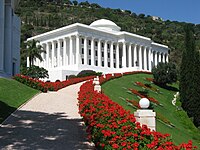Qardania
United Republic of Qardania Qardania | |
|---|---|
| Status | Independent State |
| Capital and largest city | Wartakk |
| Official languages | Qardani |
| Religion | Varushi |
| Demonym(s) | Qardari |
| Government | Constitutional Diarchy |
• Second Qardino of Qandri | Liboq Qandri (Patriarch) Yalli Qandri (Matriarch) |
• President | Vindios Tirr |
• District Governor | Terri Pojk |
| Legislature | Bicameral National Congress |
| Establishment | |
• Act of Unification | 1689 |
• Diarchy | 1700 |
• Republic | 1822 |
| Population | |
• 2018 census | 29,000,000 |
| GDP (nominal) | estimate |
• Total | $1.103 Trillion |
• Per capita | $38,043 |
| Currency | Karda (QDK) |
| Time zone | UTC +7 |
| Date format | dd/mm/yyyy |
| Driving side | right |
| Internet TLD | .qa |
Geography
The thriving capital is Qardania, the seat of power politically, as well as being central hub for the Varushi faith under the Qardino (Qardani for: Qar [God] Sent). Wartakk has a population of around 6.9 million people, making it the largest city in Qardania.[1] Other major cities include: Tirrol, Raanka, and Galilia.[2]
History
Old Kingdoms, Republics, and Duchies
- Jeqra — A Kingdom that existed in the southwest of Qardania that had extensive trade with neighboring kingdoms and regions outside of Qardania, leading this kingdom to be the most culturally diverse in Qardania’s Pre-unified history, with it’s capital Galilia, which still stands to this day, and remains as a major seaport, and center of cultural diversity in Qardania.[3]
- Poltakk — A Kingdom which acted very Spartan like, mainly due to it’s Pavi controlled government, who valued order under their sole rule, and seeking to expand their purist ideology raided and attacked, many neighboring Kingdoms and Republics, which were all Varushi. A coalition war finally bought a swift end to the Kingdom of Poltakk, and lead to a mass extermination of Pavi believers, and kingdoms would continue to fight for control, resettling new Varushi communities under each of their respective banners. This area would eventually give birth to a new neutral Varushi City-State called Wartakk, where the Act of Unification would be signed, leading to the birth of the first kingdom of Qardania.
- Grazza — The first Qardani Republic, with its capital being the port city of Tirrol in the northeast of Qardania. Tirrol is still a coastal port city, but not as big compared to a city such as Galilia. Grazza today as a province still keeps all of it’s previous borders it had before Uniting with the rest of Qardania in 1722, but only as an slightly more autonomous Province. They agreed to join Act of Unification in 1722 under the condition of keeping and maintaining independent trade deals, which was 33 years after the Act was initially signed in 1689. There was a slight disagreement between The government of Grazza and the central government of Qardania in 1791 over foreign trade issues, but it was eventually worked out and Grazza remains the most economically independent region in Qardania.
- Other places: Qurqania, Qreidda, Miruqan, Qreviel.
Conglomeration
- First Kingdom of Qardania
- Confederation of Varushi Republics
Unification
- 1689 CE: United Kingdom of Qardania
- 1700-1822: Diarchy
- 1822-present: United Republic of Qardania
Politics
Qardino
The main purpose of the Qardino is to act as the symbolic heads of state, as well as the traditional heads of the Varushi faith. They deal with matters mostly concerning the Varushi faith, and can seek assistance from the Council of Clergy in Wartakk for guidance if need be. This doesn’t mean that the Qardino have no political say. The Qardino does have access to reserve powers that can be enacted in times of national crisis if the President isn’t able to properly perform their duties. These powers are allowed to be revoked by the National Congress if they are deemed to being improperly utilized.[4]
Executive branch
President Vindios Tirr is the Executive Head of Qardania. The president is entitled to all powers granted him/her under Qardanian code and law, the president has the power to veto decisions by the National Congress, unless at least 60% of representatives and rinisters made the decision. The President is the head of the Qardanian armed forces. The President is answerable to the Qardino during times of impeachment or national crisis.
The District Governor is appointed by the President to play the role as Mayor of Wartakk, as well as to be able to appoint Ministers to the House on behalf of the Capital. The District Governor also acts as a representative for Wartakk in the National Assembly. The current District Governor is Terri Pojk.
If the President were to resign, die in office or otherwise be removed from office, the District Governor would become President as well as continue his duties as District Governor for 6 months until an election can be organized, or just until the next election cycle, if it's less than 6 months away. The District Governor can also appoint a temporary replacement in this case if he so desired, and wanted to focus on running the country as President.
A Provincial Governor is the Executive official of a Province, and head of the Provincial government. They are entitled to certain powers given to them under Qardanian code and law. They are elected every 4 years, and have no term limit. The Provincial Governor of Grazza is Rennay Qei.[4]
Legislative branch
The National Congress is a bicameral legislative body which currently hosts 213 representatives and Ministers. 30 in the National Assembly. 183 in the House of Ministers. Very rarely does the entire congress meet as a whole, as 1 single house.
Provincial Governors appoint Ministers to the House of Ministers based on overall population, 1 Minister for every 500,000 people, regardless if they're citizens or Immigrants working to become citizens. To cut down the power of the capital (Wartakk) in political say, the amount of Ministers that are appointed by the District Governor are cut in half (rounded up). The number of representatives used be based on every 250,000 people, but was changed in 1898 due to a rapidly growing population, and the overcrowding of the House.
The National Assembly includes 2 representatives for each province, each one appointed by the Provincial Governor, and 2 more representatives from each province voted on every 3 years. In Wartakk, their power is once again halved, the District Governor becomes the representative for Wartakk in the Assembly, along with another representative elected by the city of Wartakk.[4]
Elections
- Presidential Election Cycle. Every 6 years. No term limit, unless approval rating falls below 30%, in which the President would not be allowed to run for re-election.
- Provincial Governor Election Cycle. Every 4 years. No term limit.
- National Assembly Election and appointment cycle. Every 3 years. No more than 2 consecutive terms for appointed representatives. Elected representatives have no term limit.
Culture
Religion in Qardania
Varushi Faith
The Varushi faith is based off the concept of balance and duality. In fact, the name comes from the ancient Kadrani word for “balance/order”. The Varushi Faith has a creation myth, where a being simply known as Qar was once mortal, and upon his death, his soul was in the most perfect state of order and duality that his soul contributed balance and order to the world, creating the cycles of Night and Day, the creation of man and woman, and the duality of the Sun and Moon. He was the First to live, and the first to die, creating the universal laws of Life and Death. Meaning that Life and Death are as important as the other.
The Varushi believe that Qar continues his mission of maintaining balance and order to this day. However, those who seek to also contribute to balance and order must do so in life, in order to be prepared to do so in death. If you lead an evil and wrongful life, you will contribute to war, crime, and famine after death. If you lead a good and peaceful life, you will contribute purity, dullness, and repetition. If you live a life that’s the balance of the 2, you might contribute attributes from both to the world, knowing when nations should fight, knowing who should live or die. Varushi is such a potent faith in Qardania, that symbols of Duality and order are seen in the modern nation of Qardania, and all throughout the history of the previous kingdoms and republics of Pre-unified Qardania.
The Qardino (Qar Sent) is the married religious and royal heads of Qardania who stand as symbols of unity and national identity. They are always a man and woman, keeping with the values of duality and order. Same sex relationships and marriage are extremely taboo amongst the Varushi, and it’s seen as unbalanced and unorderly. The Qardino can name a married couple as heir only if they are blood related. If the Qardino dies and they have no apparent heir, the ‘Wartakk Council of Clergy’ will democratically vote for a new Qardino, but the new Qardino must be married in order to be voted on, and must be willing. Contributing to the civic and spiritual duties that come with the title.[5]
Pavi Faith
The Pavi are an offshoot minority religion of the Varushi, who instead of believing in order and balance, believe that Qar’s soul contributed chaos and conflict through achieving inner medium. They believe that this made Qar go mad with a split personality. They believe that the world must all be 1 thing or the other. The world must be united under 1 banner, with a strict set of rules and laws, or order must perish and leave individuals to their own devices. This leads to groups of militarist extremists and isolationists, who wish to keep to themselves, or it may also spur Purist nationalism, rebellion, and terrorism.[5]
References
- ↑ Wartakk, the Capital of Qardania (6 May 2017)
- ↑ Cities and Geography (10 May 2017)
- ↑ The History of Qardania (10 May 2017)
- ↑ 4.0 4.1 4.2 The United Republic of Qardania (10 May 2017
- ↑ 5.0 5.1 Religion and the Varushi Faith (10 May 2017)


